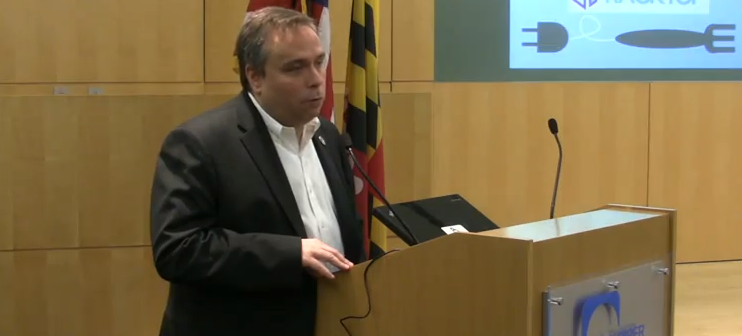Chris Tonjes, city CIO and director of the Mayor’s Office of Information Technology, is “drafting an ‘alternative plan’ to overhaul” the phone system of Baltimore city government.
It’s another chapter in a months-long fight the city has been in over how city phone contracts were doled out.
Any overhaul would involve getting the city out of the business of managing phone lines, something Tonjes has hinted at in the past: At December’s Baltimore TechBreakfast he posed the rhetorical question, “In this day and age, is it really a good idea for the city to be in the phone business?”
His proposed plan, which he intends to have done within 30 days, calls for the mayor’s office to approve a move to convert the city’s existing phone system to a VoIP system, reports the Baltimore Sun. Right now the city’s phone system is managed by the Municipal Phone Exchange within the city comptroller’s office, with 23 employees and an annual phone bill of $16 million.
According to the Sun, “Tonjes has estimated that Baltimore could save 15 percent of its $16 million annual phone bill, or $2.4 million a year, simply by eliminating idle phone lines.”
Read the full story at the Baltimore Sun.
As Technically Baltimore has reported, Comptroller Joan M. Pratt and Mayor Stephanie Rawlings-Blake have been arguing since last summer over which office should oversee any VoIP upgrade to the city’s phone system, independent of the plan Tonjes is now proposing.
While Pratt claims the city should be purchasing a VoIP upgrade through IBM, which went through a request-for-proposal process and was the lowest bidder, the mayor’s office has been paying Digicon Corp., with offices in Rockville, to upgrade the city’s phone system, even though Digicon didn’t participate in the bidding process. An investigation in the fall by then-city Inspector General David N. McClintock revealed that the purchase of more than $675,000 of VoIP equipment by the mayor’s office “found possible conflicts of interest and missed opportunities for ‘significant cost savings.’”
Meanwhile, an audit released last week of the Municipal Phone Exchange and commissioned by Pratt shows that as much at $700,000 could be saved within the city’s phone system each year, according to the Baltimore Brew. The audit, completed by the Rochester, N.Y.-based HPA Consulting, reports that between 15 percent and 40 percent of the phone lines in the city’s phone system could be disconnected.
Join the conversation!
Find news, events, jobs and people who share your interests on Technical.ly's open community Slack

Baltimore daily roundup: Medtech made in Baltimore; Sen. Sanders visits Morgan State; Humane Ai review debate

Baltimore daily roundup: An HBCU innovation champion's journey; Sen. Sanders visits Morgan State; Humane Ai review debate

Baltimore daily roundup: The city's new esports lab; a conference in Wilmington; GBC reports $4B of economic activity

